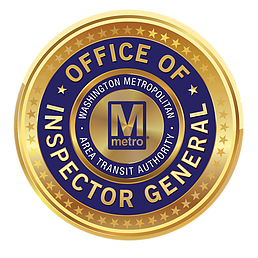The Knighton Awards recognize the best performance audit reports of the year. Audit shops compete against peer shops of similar size for this prestigious award. The Knighton Award is the highest honor bestowed by the Association of Local Government Auditors (ALGA), acknowledging the top performance audit reports issued by its 300+ local government audit organization members. Audits are evaluated based on various criteria, including their potential for significant impact, the persuasiveness of their conclusions, a focus on improving government efficiency and effectiveness, as well as clarity and conciseness.

About the Audit
The Washington Metropolitan Area Transit Authority (the Authority) manages over 1500 non-revenue vehicles that are used to support the Authority’s administrative, maintenance, construction and/or operational functions. In FY 2019, the Authority spent almost $8 million on unleaded fuel and over $17 million on diesel fuel for non-revenue vehicles. The audit objective was to assess the controls and accountability over fuel for non-revenue vehicles. The audit found that improvements were needed in controls over (1) fuel acquisition, delivery, and consumption, (2) segregating duties for fuel delivery, (3) physical security at facilities and fuel pumps, and (4) excessive vehicle idling during work hours. Tests showed there were over 1.17 million gallons of unaccounted fuel transactions valued at over $2 million. OIG could not validate these transactions as legitimate because current and former employees could easily pump fuel into unauthorized vehicles, using codes which gave the appearance of a valid transaction. For example, 211 separated employee identification numbers were inappropriately used as validation to pump over 4,500 gallons of fuel. Further, OIG observed significant process gaps and an overall inadequate control environment to prevent or detect fraud. Lastly, these control deficiencies resulted in excessive vehicle idling time that wasted fuel valued at over $187,000.
What the judges said
This audit assessed the controls and accountability for using fuel, which is a major liquid asset at the risk of fraud and abuse on a daily level. Not only did the audit find significant control improvements are needed to the overall fuel program, but it also found current employees were inappropriately using separated employee identification numbers to pump over 4,500 gallons of fuel. The report commenced with a strong “Results in Brief” section, which highlighted why the report was important, what the auditors found, and management’s responses. As for the flow of the report, it was impressively written. Each finding contained: the Finding, What Is Required, What We Found, Why This Occurred, Why This Is Important, and Recommendations. Visuals such as tables, charts, and graphs were easy to read. Both the findings and recommendations were well-structured and appropriately differentiated. In addition, we found the recommendations to be practical, feasible, and fair. Overall, we were impressed with the clarity and flow of the report, which brought readers along with the message. This truly was an exemplary report.
Q&A with the audit team
Tell us a little about the audit team
This audit was performed by Yamani Dole, Bob Batta, and Chantelle Barnes. Yamani is a CIA, CFE and CGAP and has extensive experience auditing both in government and the private sector. Bob is a CFE and has worked in auditing for over 40 years. He has also worked in eight Inspector General offices and was an OIG Senior Executive. Chantelle is a CFE and CIGA and was recently promoted to Senior Auditor. In addition, Chantelle is pursuing a master’s degree in Cyber Accounting and has varied experience in the areas of internal controls, compliance, and internal audit.
What are you most proud of about this audit?
Our audit developed and provided information to the Authority about the effectiveness of the non-revenue vehicle fuel program. The audit highlighted significant process gaps, and OIG made 11 recommendations to add value to the program and organization. The impact of this audit was substantial as it reviewed inefficient and non-compliant administrative processes and program governance controls. This audit received significant media attention and was covered by several local and national media outlets. As part of the Corrective Action Plan process, the Authority was able to identify an additional $1.6 million in cost savings if all the proposed corrective measures materialized, and reduce vehicle idle time, which benefits our environment.
What is one thing you learned while working on this audit that you think would be valuable to ALGA members?
The importance of implementing effective controls over fuel acquisition, delivery, and consumption. It is important for organizations to establish clear policies and procedures for fuel acquisition, delivery, and consumption, as well as to segregate duties to prevent fraudulent activities. Physical security measures should also be implemented at fuel facilities and pumps to ensure that fuel is only being used for authorized purposes. By implementing effective controls in these areas, organizations can help to minimize the risk of fraud, waste, and abuse related to its fuel programs, and ensure that resources are being used efficiently and effectively.
